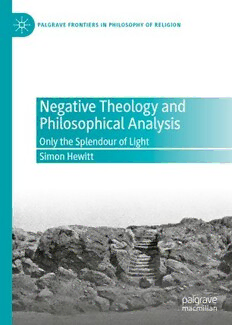
Negative Theology and Philosophical Analysis: Only the Splendour of Light PDF
Preview Negative Theology and Philosophical Analysis: Only the Splendour of Light
PALGRAVE FRONTIERS IN PHILOSOPHY OF RELIGION Negative Theology and Philosophical Analysis Only the Splendour of Light Simon Hewitt Palgrave Frontiers in Philosophy of Religion Series Editors Yujin Nagasawa Department of Philosophy University of Birmingham Birmingham, UK Erik J. Wielenberg Department of Philosophy DePauw University Greencastle, IN, USA Palgrave Frontiers in Philosophy of Religion is a long overdue series which will provide a unique platform for the advancement of research in this area. Each book in the series aims to progress a debate in the philoso- phy of religion by (i) offering a novel argument to establish a strikingly original thesis, or (ii) approaching an ongoing dispute from a radically new point of view. Each title in the series contributes to this aim by utilis- ing recent developments in empirical sciences or cutting-edge research in foundational areas of philosophy (such as metaphysics, epistemology and ethics). More information about this series at http://www.palgrave.com/gp/series/14700 Simon Hewitt Negative Theology and Philosophical Analysis Only the Splendour of Light Simon Hewitt School of PRHS University of Leeds Leeds, UK Palgrave Frontiers in Philosophy of Religion ISBN 978-3-030-49601-2 ISBN 978-3-030-49602-9 (eBook) https://doi.org/10.1007/978-3-030-49602-9 © The Editor(s) (if applicable) and The Author(s), under exclusive licence to Springer Nature Switzerland AG 2020 This work is subject to copyright. All rights are solely and exclusively licensed by the Publisher, whether the whole or part of the material is concerned, specifically the rights of translation, reprinting, reuse of illustrations, recitation, broadcasting, reproduction on microfilms or in any other physical way, and transmission or information storage and retrieval, electronic adaptation, computer software, or by similar or dissimilar methodology now known or hereafter developed. The use of general descriptive names, registered names, trademarks, service marks, etc. in this publication does not imply, even in the absence of a specific statement, that such names are exempt from the relevant protective laws and regulations and therefore free for general use. The publisher, the authors and the editors are safe to assume that the advice and information in this book are believed to be true and accurate at the date of publication. Neither the publisher nor the authors or the editors give a warranty, expressed or implied, with respect to the material contained herein or for any errors or omissions that may have been made. The publisher remains neutral with regard to jurisdictional claims in published maps and institutional affiliations. Cover illustration: powerofforever / Getty Images This Palgrave Macmillan imprint is published by the registered company Springer Nature Switzerland AG. The registered company address is: Gewerbestrasse 11, 6330 Cham, Switzerland For my parents. Acknowledgements I was funded by the Leverhulme Trust under their Early Career Research fellowship scheme during the period in which this book was written. Previous time spent with the ERC-funded Nature of Representation Project at the University of Leeds allowed me the space for thinking about language and mind which has found its way especially into Chap. 8. Robbie Williams led that project and was an excellent mentor, and Gail Leckie was especially generous in spending time talking about issues around linguistic priority. The Centre for Philosophy and Religion at Leeds provided an excellent testing ground for the ideas contained in this book. Parts of the material were presented to audiences at the International Journal for Philosophy and Theology’s anniversary ‘Sisters in Arms’ Conference in January 2019 in Cambridge, to the Medieval Philosophy Network in London, to the Leeds PRHS Work in Progress seminar and to the Society for the Study of Theology. I would also like to thank Mikel Burley, Brian Davies OP, Bob Eccles OP, Fiona Ellis, Jessica Eastwood, Peter Hunter OP, Sam Lebens, Robin le Poedevin, Franco Mani, Rachel Muers, Jonathan Nassim, Paul O’Grady, Rebecca Stephens, Sussanah Ticciati, Catherine Wallis-Hughes, Roger White and Mark Wynn. Tasia Scrutton deserves thanks for so much, not least for an enduring love of the sort that is a model of how we created beings can faithfully image that uncreated love which lies beyond the competence of our concepts. vii viii Acknowledgements Special thanks go to the London fraternity of the Lay Dominicans, of which I am a member. In a sermon preached to the English provincial chapter of the Dominican friars, Herbert McCabe set out a vision of the Dominican vocation as being to proclaim the mystery of God, in particu- lar that God is not a god, an object within the universe competing with us for metaphysical space. Just before concluding he said, This is the task of preaching that, it seems to me, we are here this week to organise, the task of telling men that they can have images if they like, they may do no harm, but they are not what we are talking about, none of them are God: God is not part of the world, God is the unfathomable mystery of love by which the world is; there are no gods, there is only this love.1 That is indeed our vocation, and I am grateful to the London Lay Dominicans for helping me to live it. But before any other vocation, and a prerequisite for it, stands the vocation to be human. For that I was formed, and continue to be, by my parents, Peter and Anne Hewitt, and I dedicate this book to them. 1 McCabe 1987, p. 242. Contents 1 God Beyond Words 1 2 A nalytic Criticisms of Apophaticism 19 3 Analytic Apophaticisms 37 4 Referentialism and Religious Language 55 5 G rammatical Thomism 71 6 Th e Grammar of God-Talk 89 7 Speaking of God: Truthfully and Devotedly 109 8 Is God a Person? 127 9 Incarnation and Trinity 143 ix x Contents 10 Politics, Kingdom, Beatific Vision 161 Bibliography 177 Index 189
